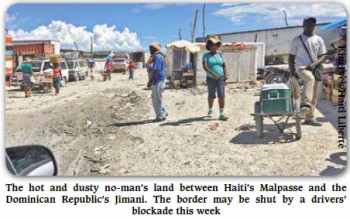|
 On Oct. 29, Dominican and Haitian
transport unions will set up picket-lines and barricades
to shut down all motorized traffic between Haiti and the
Dominican Republic until Haiti’s
ban on 23 Dominican products
is lifted. The ban is hurting their livelihoods, the
drivers’ unions say. On Oct. 29, Dominican and Haitian
transport unions will set up picket-lines and barricades
to shut down all motorized traffic between Haiti and the
Dominican Republic until Haiti’s
ban on 23 Dominican products
is lifted. The ban is hurting their livelihoods, the
drivers’ unions say.
Since the beginning of October, the daily buses
of the Dominican-owned Caribe Tours and Haitian-owned
Capital Coach Line, which carry thousands of people
between Haiti and the Dominican Republic each week, have
not been running due the repercussions created by the
Haitian government restriction on trucked imports.
The majority of overland travelers move between
the two capitals, Port-au-Prince and Santo Domingo.
To do so now, one must either drive by private
car (rental cars are impossible or costly to take
across), or travel by bus to the border, then walk for
200 yards through a hot, dusty, chaotic no-man’s land of
merchants, hustlers, and customs and immigration
officials. Then one must take a motorcycle to get a
public bus from Jimani to Santo Domingo or from Malpasse
or Fond Parisien to Port-au-Prince.
Instead of the seven to eight hours it takes on
one of the international bus lines, which are somewhat
expedited through immigration and customs, an
individual’s journey over the 154 miles can take as long
as 10 or 12 hours.
The journey becomes particularly arduous when
traveling by public transportation from the border
toward the Dominican capital. For example, on Oct. 27,
Dominican Army checkpoints stopped a crowded public bus,
on which a Haïti
Liberté journalist was traveling, 10 times to check
passports and baggage. The bus’s passengers were almost
exclusively Haitian.
At every single checkpoint, the Dominican bus
driver inconspicuously slipped some folded bills to the
commander conducting the search as he boarded the bus.
Sometimes, the checkpoints were less than five miles
apart.
In August, the Dominican truckers’ union
FENATRADO union
blocked all transport of
freight between the DR and Haiti, saying that
about 60 of their drivers’ trucks had been pelted by
rocks in Haiti due to tensions that have arisen between
the two countries over the
Dominican government’s
stripping citizenship from Dominicans born to
undocumented Haitian parents retroactive to 1929. On
average, some 200 Dominican freight trucks cross the
border to Haiti every day.
Now the Dominican drivers’ union has joined with
its Haitian counterpart to stop all border crossings at
Ouanaminthe/Dajabon, Belladère/Elias Pina, and
Malpasse/Jimani until the lifting of the Haitian government’s ban on
overland transport of products such as wheat flour,
laundry soap, drinking water, butter, noodles, PVC
pipes, beer, and mattresses.
Presently, such products can only be shipped by
sea or air, which the Dominican and Haitian drivers say
is hurting them and their families.
The unions sent a letter last week to the offices of
Caribe Tours and Capital Coach Line to explain that
their upcoming action of blocking the border was not
directed against the bus companies but against the
policy of the Haitian government.
|